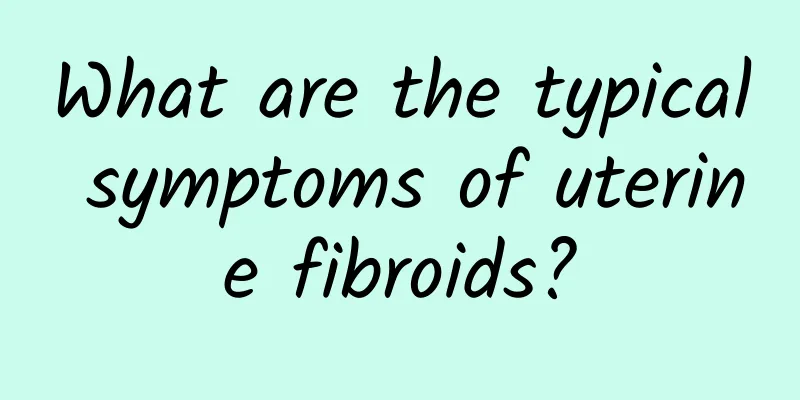What are the symptoms of uterine fibroids?

|
What are the signs of uterine fibroids? Uterine fibroids are one of the common gynecological tumors. They are masses formed by the proliferation of uterine smooth muscle cells. According to statistics, about 70% of women of childbearing age suffer from uterine fibroids to varying degrees. However, different people may show different symptoms, and some people may not even have obvious symptoms. So, what are the symptoms of uterine fibroids? The following are some common signs for your reference. 1. Irregular menstruation: Uterine fibroids may cause changes in menstrual volume, such as excessive, insufficient, abnormal, and prolonged continuous bleeding. Some women may experience abnormal conditions such as prolonged menstruation, dark red menstrual blood, and obvious clots. 2. Hemorrhage: Long-term continuous bleeding caused by uterine fibroids may cause hemorrhage symptoms, that is, heavy bleeding in a short period of time, which can bring serious physical discomfort and the risk of anemia. 3. Pelvic pain: The growth of uterine fibroids may cause some compression on the uterus and nearby tissues, leading to pelvic pain. Some women may experience lower abdominal discomfort, back pain, or persistent abdominal distension and pain. 4. Frequent urination and urgency: If uterine fibroids compress the bladder, women may experience urinary tract symptoms such as frequent urination and urgency. The frequency of frequent urination increases significantly, and urgency feels difficult to control. 5. Difficulty in defecation: Large uterine fibroids may put pressure on the intestines and surrounding tissues, leading to digestive system problems such as difficulty in defecation, constipation, and abdominal bloating. 6. Infertility: Uterine fibroids may affect the normal function of the uterus and bring difficulties to pregnancy and childbirth. If fibroids grow in the uterine cavity, they may hinder the implantation of the embryo and cause miscarriage. 7. Enlarged belly: If uterine fibroids grow larger, the abdomen will visibly swell, sometimes to the same size as during pregnancy. It is important to note that although uterine fibroids may cause some of the above symptoms, some women may not have any obvious signs. If you suspect that you have uterine fibroids, you should see a doctor as soon as possible for diagnosis and treatment by a professional doctor. In short, there are many possible signs and symptoms of uterine fibroids, such as irregular menstruation, hemorrhage, pelvic pain, frequent urination, difficulty in defecation, infertility and abdominal distension. These symptoms not only have a serious impact on women's physical health, but may also cause trouble in daily life and fertility. Therefore, for women who are worried about having uterine fibroids, early examination and diagnosis are very important so that appropriate treatment measures can be taken in time to maintain their health. |
<<: What color is uterine fibroid bleeding? Is uterine fibroid bleeding cancerous?
Recommend
What are the symptoms of uterine fibroids
Nowadays, uterine fibroids are very common in cli...
Does uterine fibroids affect menstruation? It depends on the location and size
Uterine fibroids are one of the most common gynec...
What symptoms can be used to preliminarily diagnose whether ovarian cysts affect menstruation?
What symptoms can be used to preliminarily diagno...
Endometriosis pain every day
Women with endometriosis may experience significa...
Do uterine fibroids affect sexual desire?
Uterine fibroids themselves rarely interfere with...
Lose weight quickly! Try the 5-Week Diet Plan
To lose weight, you must first detoxify, and deto...
TCM Diagnosis of Pelvic Effusion
Pelvic effusion is a common gynecological disease...
Why hasn't your period come yet?
Why hasn’t my period come yet? Absence of menstru...
Experts help you understand acute cervicitis
Most patients with acute cervicitis will suffer f...
Breast examination for perimenopausal women
What are the breast examinations for perimenopaus...
How much does it cost to treat vaginal candidal infection?
Nowadays, more and more female friends suffer fro...
Several common misunderstandings about ovarian cysts
There are some misunderstandings about ovarian cy...
What are the symptoms of cervical erosion?
As people's minds become more open, many fema...
How to choose a regular hospital for endometrial tuberculosis
Endometrial tuberculosis is a sexually transmitte...
Why is vaginitis so easy to recur?
Vaginitis is a very common gynecological disease....









